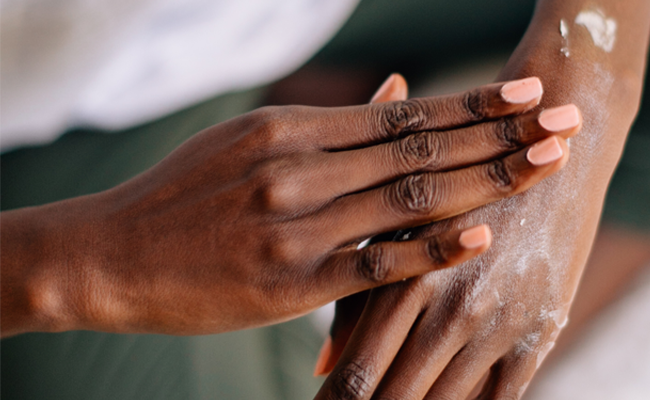The Black Cosmetics Industry: A Big Market with a Big Problem
The Black community represents about 13 percent of the U.S. population. African American spending contributes 22 percent to the personal care products market, valued at $42 billion annually. Black women, specifically, are one of the largest consumers of personal care products compared to the entire American population.
In an EWG analysis of over 1,000 cosmetic products, report findings concluded that a smaller group of Black hair and beauty products scored lower in possibly hazardous ingredients than products marketed to the general public. However, limited product selections could correlate with higher exposure to harmful chemicals than the general public.
Ingredients in approximately 1,177 products were tested with the scoring system of EWG's Skin Deep® Cosmetics Database. It’s a free resource where you can find less-hazardous personal care product alternatives. Skin Deep® compares each product’s ingredients to over 60 regulatory and toxicity databases and scientific studies. It also rates each product on a scale from 1 (lowest hazard) to 10 (highest hazard).
Most traditional Black beauty products are too toxic for everyday use
Compared to 40% of the products available to the general public and analyzed by Skin Deep®, less than ¼ of the personal care items marketed to Black women scored low in potentially toxic ingredients. Both market segments had an equal percentage of products that scored as “high hazard,” but the disproportionate amount of Black beauty products that scored as “low hazard” indicates that there is a slimmer selection of safer-scoring products available to Black women.
Tested product ingredients had links to several potential hazards and adverse health effects, including:
- Cancer
- Allergies
- Hormone disruption
- Developmental and reproductive damage
Among the worst-scoring products with high potential hazards were hair colors, hair relaxers, bleaching products, concealers, and foundations.
Natural beauty products are now dominating the Black beauty space
Developing research on the dangers of personal care products marketed to Black women is still in its infancy stages. However, existing studies have raised concerns amongst the Black community (and rightfully so).
Over recent years, demand for harsh products has fallen as natural and organic beauty products become increasingly popular amongst Black women. For instance, market analysis firm Mintel reported a 40 percent drop in sales of Black hair relaxers between 2008 and 2015.
Consequently, there are rising demands for products designated for natural hair (e.g., conditioners, shampoos, and styling products). Natural hair product sales increased by 27 percent between 2013 and 2015, making up about 35 percent of the Black haircare market.
That doesn’t go without saying that there’s still work to be done in the natural hair consumer product space. While most of these products have fewer harmful ingredients than traditional hair products, they’re still infiltrated with potentially hazardous ingredients.
Lab studies on products frequently used by Black women, from natural skin lotions to hair creams, showed signs of estrogenic or ani-estrogenic activity. This means that they emulated the functions of the hormone estrogen. Other scientific reports suggested that African Americans had higher urinary concentrations of hormone-disrupting parabens that are commonly found in personal care products, foods, and pharmaceuticals.
Potentially toxic ingredients
Parabens: Linked to hormone disruption and fertility issues. Found in over 50 foundations and concealers.
Retinyl palmitate: May cause growth of skin lesions and tumors on sun-exposed skin. Found in nearly 30 percent of foundations and two-thirds of concealers meant for Black women.
Formaldehyde-releasing preservatives. Potent allergen and skin sensitizer, Used in cosmetics for preservation purposes.
Fragrance: A potential hormone disruptor and allergen. Found in more than 3,000 ingredients and more than half of the evaluated products.
BLK + GRN’s commitment to solving the problem
With help from Black health experts, BLK + GRN carefully handpicks all Black artisans that we feature on our marketplace. We solely carry all-natural product offerings, as we have firsthand experiences with the detrimental effects of hazardous ingredients that have plagued the Black community for years. On our marketplace, you’ll only find non-toxic brands that are fully aligned with our conscious values.
Shop Consciously with BLK + GRN
If you’re searching for non-toxic personal care products, BLK + GRN provides the ultimate shopping experience. Our carefully-curated marketplace carries products that are free of these top 20 toxic ingredients.
Shop the hottest products on our marketplace right now!
